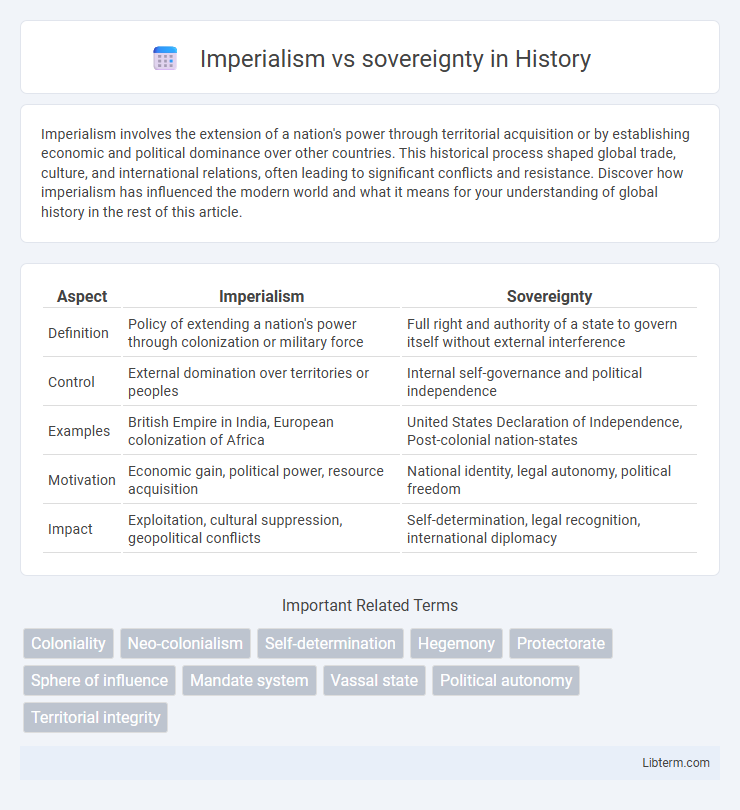Imperialism involves the extension of a nation's power through territorial acquisition or by establishing economic and political dominance over other countries. This historical process shaped global trade, culture, and international relations, often leading to significant conflicts and resistance. Discover how imperialism has influenced the modern world and what it means for your understanding of global history in the rest of this article.
Table of Comparison
| Aspect | Imperialism | Sovereignty |
|---|---|---|
| Definition | Policy of extending a nation's power through colonization or military force | Full right and authority of a state to govern itself without external interference |
| Control | External domination over territories or peoples | Internal self-governance and political independence |
| Examples | British Empire in India, European colonization of Africa | United States Declaration of Independence, Post-colonial nation-states |
| Motivation | Economic gain, political power, resource acquisition | National identity, legal autonomy, political freedom |
| Impact | Exploitation, cultural suppression, geopolitical conflicts | Self-determination, legal recognition, international diplomacy |
Understanding Imperialism: Definition and Historical Context
Imperialism involves the extension of a nation's authority through territorial acquisition or political and economic control over other territories, often undermining the sovereignty of indigenous states. Historically, imperialism surged during the 19th and early 20th centuries with European powers establishing vast colonial empires in Africa, Asia, and the Americas. This expansion reshaped global power dynamics, triggering resistance movements focused on reclaiming sovereignty and self-determination among colonized peoples.
Defining Sovereignty: Core Principles and Evolution
Sovereignty fundamentally refers to the supreme authority of a state to govern itself without external interference, rooted in core principles such as territorial integrity, political independence, and legal equality among states. Historically, sovereignty has evolved from the absolute power held by monarchs to modern concepts emphasizing popular sovereignty and the rule of law within international frameworks. This evolution challenges imperialism by asserting the right of nations to self-determination and resisting external domination or control.
The Origins of the Imperialism vs Sovereignty Debate
The origins of the imperialism versus sovereignty debate trace back to the 19th-century expansion of European powers seeking territorial control beyond their borders, which challenged the traditional notion of state sovereignty as inviolable territorial authority. The Treaty of Westphalia (1648) established sovereignty as a foundational principle of international law, but imperialism disrupted this balance by asserting dominance over non-European regions without regard for established governance. This conflict sparked ongoing discourse about the legitimacy of external control versus self-determination, influencing modern international relations and law.
Political Motivations Behind Imperial Expansion
Imperial expansion was driven primarily by political motivations such as the desire to increase national power, secure strategic military bases, and enhance global influence. Colonial powers sought to extend their sovereignty by controlling territories that offered geopolitical advantages and resources vital to national security. These ambitions often clashed with the sovereignty of indigenous nations, leading to conflicts and the imposition of foreign governance structures.
Sovereignty as a Defense Against External Control
Sovereignty acts as a fundamental defense against external control by asserting a nation's autonomous authority over its territory, laws, and governance. It empowers states to resist imperialist agendas that seek to impose economic, political, or military dominance. Upholding sovereignty ensures protection of cultural identity, legal independence, and the ability to pursue self-determined development without foreign interference.
Economic Impacts: Imperialism versus Sovereign Autonomy
Imperialism often exploits colonized regions by extracting resources and imposing economic systems favoring the imperial power, leading to wealth centralization and dependency. Sovereign autonomy enables nations to control their own economic policies, prioritize local development, and engage in fair trade practices that enhance long-term growth. The economic divergence between imperial control and sovereign self-governance highlights disparities in wealth distribution, infrastructure investment, and market access.
Cultural Consequences: Identity, Assimilation, and Resistance
Imperialism often disrupts indigenous sovereignty by imposing dominant cultural norms, leading to identity erosion and forced assimilation among colonized populations. The cultural consequences include the loss of native languages, traditions, and social structures, which fuels resistance movements aimed at reclaiming autonomy and preserving heritage. These struggles underscore the complex interplay between imperial power and the resilience of indigenous identities.
International Law and the Legitimacy of Sovereignty
International law upholds the principle of sovereignty as the foundation of state legitimacy, emphasizing territorial integrity and political independence. Imperialism historically challenges this norm by imposing external control, undermining sovereign rights and violating United Nations Charter provisions. The legitimacy of sovereignty is strengthened through recognition by the international community and adherence to legal frameworks that prohibit intervention and protect self-determination.
Modern-Day Examples: Case Studies of Conflict and Cooperation
Modern-day examples of imperialism versus sovereignty include the South China Sea disputes, where China's expansive territorial claims conflict with the sovereignty of neighboring Southeast Asian nations, highlighting ongoing geopolitical tensions and military posturing. Another case is Russia's annexation of Crimea in 2014, which violated Ukraine's territorial sovereignty and triggered international sanctions and diplomatic conflicts. Conversely, cooperative frameworks like the African Union's efforts to promote regional sovereignty and resolve border disputes peacefully demonstrate attempts to balance influence while respecting national autonomy.
Balancing Power: Navigating Imperialism and Sovereignty in the 21st Century
Balancing power in the 21st century requires navigating the tension between imperialism and sovereignty, where states assert control over their political and economic systems while facing pressures from global powers seeking influence. Sovereignty must be preserved through diplomatic strategies and international law to resist neo-imperial interventions that undermine self-determination. Effective management of this balance ensures national autonomy while engaging in the interconnected global order shaped by economic and military power dynamics.
Imperialism Infographic

 libterm.com
libterm.com